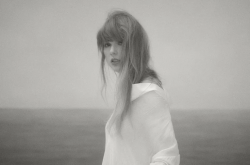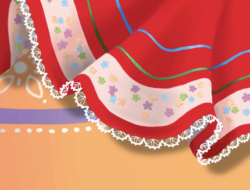What do pink-collared blouses turned into straightjackets and cheerleading uniforms doused in blood have in common? In Paula Vogel’s The Mineola Twins, Woolly Mammoth Theatre Company’s newest production, both are integral components of each sister’s personal hell.
The Mineola Twins portrays 36 years of feminine confusion as experienced by two identical twins on opposite sides of the political and emotional spectrums. The action within the play revolves around the administrations within which the women live. From Eisenhower to Nixon to Bush, the twins’ ways of dealing with the pressures of defining their womanhood couldn’t be more different. But the twins’ opposite reactions ultimately bring each along similar paths, a possibility Vogel introduces using parallel details of their lives, including their similar hellish dream sequences.
Woolly Mammoth’s production of The Mineola Twins consistently and hilariously utilizes the absurd to show us just how far each is willing to go in the search for self. In a world in which, as Myrna’s boyfriend says, “girls don’t do, they just are … girls are born the way they are, men must become,” Myra is the feminist and Myrna is the feminine. Myra looks for herself in the Village and the beds of every man on the football team, in drugs and tie-dye, in political protests and an intense job at Planned Parenthood. Myrna, on the other hand, turns to recipe collecting, teased hair, frilly aprons, psychotherapy and her own ultra-conservative radio show. Though the plot centers around the conflict between the twins, Vogel carefully weaves an ending that ties up only about half of its loose strings while leaving the rest of them-and the audience-hanging.
The play requires enormous quantities of energy and insight from each of the three main actors in the play. Vogel’s written dialogue is quick, witty, and, most of the time, utterly inappropriate. Her clever words and irreverent humor are incessant and could be easily butchered by an actor with less verve than Sarah Marshall, who plays both Myra and Myrna. Luckily, Marshall, under the deft direction of Darryl V. Jones, plays up each off-kilter scenic detail while maintaining the emotional intensity of the themes running within each relationship.
Marshall’s theatrical versatility is most striking when playing one twin pretending to be the other, honing in on the emotional and behavioral differences between the two. As she dashes between both sisters’ versions of hell and biblical parables throughout the play, Marshall plays up Vogel’s raucous dialogue with actions that leave the audience grinning in disbelief. Marshall, an adjunct professor in Georgetown’s Department of Art, Music, and Theater, consistently “goes there” again and again to the disbelieving delight of the audience.
MaryBeth Wise rises to the challenge of portraying both Myrna’s boyfriend, Jim, and Myra’s girlfriend, Sarah. Josh Lefkowitz plays the sons of each twin, Kenny and Ben. Jones’ choice to use the same actors for both the significant others and children of the twins further emphasizes the correspondence between their lives, but Wise and Lefkowitz appropriately reveal completely different characters for each different part.
Absurdity rules the actions and words onstage, but the other aspects of the play are deliciously in sync with each other. The set, designed by Daniel Ettinger, is simple and precise. A rotating circle frames two versatile spaces in tones of gray, and the details of each space are filled in to indicate the era and twin. From an O’Keeffe imitation on Myra and Sarah’s bedroom wall to a portrait of herself with Barbara Bush hair in Myrna’s office, Ettinger thoughtfully utilizes the space available to emphasize the differences between the twins.
Sound serves to indicate the year: between scenes and administrations, songs from the era are played (with two bizarre dancers exhibiting the appropriate dance moves) to place the action within a pop-culture frame of reference. Costumes change with the decade as well, including thematically appropriate suits for each character.
The siblings continuously antagonize one another as their rocky relationship grows even more precarious over the years. The off-kilter details taut throughout the play make it an enjoyable experience for all. With dirty jokes , antics and profound themes, Woolly Mammoth hits its target with a resounding roar of laughter.
The Mineola Twins is playing at the D.C. Jewish Community Center at 1529 16th St., N.W., through Oct. 5. $10 tickets are available for patrons 25 and under by calling Woolly Mammoth at 202.393.3939; regular price tickets are $24-$39.




